|
|
|
Sort Order |
|
|
|
Items / Page
|
|
|
|
|
|
|
| Srl | Item |
| 1 |
ID:
098466
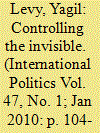

|
|
|
|
|
| Publication |
2010.
|
| Summary/Abstract |
Militaries work intentionally, visibly and in a politically controlled manner to fulfill their formal assignments as the professional perpetrators of external violence on behalf of the state. It is to this level of military action that the existing literature on the civilian control of the military is confined. However, through the intensive interaction between the military and civilians, the effects of formally controlled military activity go beyond the professional domain and are felt in civilian areas, where, in the long term, military activity helps create structures of unequal power relations. Given its structural dimension, this aspect of the military is not necessarily or immediately visible to the main agents involved; hence, it is divorced from effective civilian control. I conceptualize this neglected type of control as effectual control, distinct from the theoretically well-established notion of operational control. This paper theorizes the essence of effectual control.
|
|
|
|
|
|
|
|
|
|
|
|
|
|
|
|
| 2 |
ID:
098463
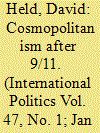

|
|
|
|
|
| Publication |
2010.
|
| Summary/Abstract |
Thinking about the future of humankind and the basis of political association in the early years of the twenty-first century does not give grounds for optimism. In particular, 9/11 has become a moment associated with a return to empire, geopolitics, political violence and the primacy of sovereignty. Yet, it is easy to overstate the meaning of 9/11 and exaggerate from one set of historical experiences. This article explores the ways in which the twentieth century set down key political and legal 'cosmopolitian steps' toward a transformation of the global order. These steps are explored and defended, and it is shown how they created the grounds for a very different response to 9/11 to the one persued by President Bush and Prime Minister Blair. Although clearly this opportunity has been temporarily lost, the failure of the Blair-Bush War on Terror reaffirms strong reasons for further developing a cosmopolitian global order.
|
|
|
|
|
|
|
|
|
|
|
|
|
|
|
|
| 3 |
ID:
098464
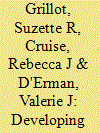

|
|
|
|
|
| Publication |
2010.
|
| Summary/Abstract |
This article examines how external third parties, particularly international organizations, can facilitate the development of security community and international integration within post-conflict societies. Focusing on seven countries in the Western Balkan region, this study offers unique insight into how and why feelings of trust and a sense of community can be encouraged by external actors - the EU and NATO in this case - and how and if trust and community can filter down to the most local levels within post-conflict societies. Ultimately, we argue that both the EU and NATO have, primarily through membership requirements to engage in regional interaction and cooperation, significantly contributed to the development of security community among Western Balkan neighbors at the elite level. However, we also find that feelings of trust and belongingness are still very much lacking among the general population of the Western Balkan region. Such insights will further efforts to enhance conflict resolution and post-conflict reconstruction in the Western Balkans and elsewhere.
|
|
|
|
|
|
|
|
|
|
|
|
|
|
|
|
| 4 |
ID:
098461
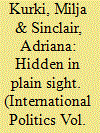

|
|
|
|
|
| Publication |
2010.
|
| Summary/Abstract |
This article argues that constructivism in International Relations (IR) suffers from certain important shortcomings in its analysis of the idea of social context. Specifically it is argued that constructivists fail to adequately engage with 'social structural' forces in world politics. While constructivists have pitched themselves as theorists who aim to account for the role of social context in world political inquiry, their conceptual focus on ideational factors - rules, norms and inter-subjective beliefs - has resulted in an inadequate, or incomplete, conceptualisation of social structure. Constructivists, it is argued here, tend to leave the role of materially embodied social structures theoretically and empirically unexplored. The limitations of constructivist treatments of social context have significant consequences for their analysis of world politics, for example, for recent constructivist attempts to deal with international law. Constructivist interventions into analysis of law remain deficient in important senses because of their failure to conceive of international law in social structural terms and because of their inability to explore in depth law's relationship with other social structures, such as patriarchy or capitalism. This entails that the structured systems of inequality and hierarchy embodied in law fail to be adequately recognised. Recognising the 'incompleteness' of the constructivist accounts of social context, we argue, is important in highlighting the often un-noted limitations of constructivist scholarship and in potentially redirecting constructivist scholarship towards closer engagement with 'critical theory' investigations into IR and law.
|
|
|
|
|
|
|
|
|
|
|
|
|
|
|
|
| 5 |
ID:
098462
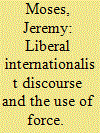

|
|
|
|
|
| Publication |
2010.
|
| Summary/Abstract |
This article analyses the liberal internationalist discourses that drew together the foreign policies of Tony Blair and George W. Bush. While it is clear that the two former leaders maintained a deep and abiding commitment to the spread of freedom and democracy to all corners of the world, very little work has been carried out to explain how these shared values related to their exercise of an aggressive foreign policy and, perhaps more importantly, what this can tell us about some of the most persistent undercurrents of liberal foreign policy practice. This article begins by illustrating the 'liberalisms' of both Blair and Bush before examining the place of globalisation, humanitarianism and democracy in their respective foreign policy doctrines. It then briefly examines whether these themes may continue under the Obama presidency. Finally, the international and domestic consequences of this form of liberal internationalism are raised. The article concludes with the claim that a failure to recognise and understand the inevitable violence generated in pursuit of unquestioned liberal values will lead those who follow Bush and Blair toward the same excessive use of force that has characterised the war on terror.
|
|
|
|
|
|
|
|
|
|
|
|
|
|
|
|
| 6 |
ID:
098467
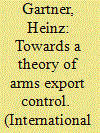

|
|
|
|
|
| Publication |
2010.
|
| Summary/Abstract |
The Wassenaar Arrangement (WA) is a multilateral regime designed to control exports of conventional arms and dual-use goods and technologies to contribute to regional and international security and stability. Unlike traditional arms control and disarmament agreements WA is not legally binding. It has to rely on cooperation and voluntary compliance of the actors concerned - principally states and industries. For them the WA provides guidance for cooperation and compliance. The question is whether the actors involved are interested in complying with the guidelines. The article applies two IR theories to address this question, liberal institutionalism and realism. One argument of liberal institutionalism is that international institutions and regimes not only have a vital catalytic role to play in promoting cooperation among states, but they also develop synergetic effects and reinforce each other in the framework of effective multilateralism. In many ways this might well be the case, but the opposite is also true. The economic interests of member states and jealousy between them have long hampered cooperation among the various regimes that have been designed to act as the multilayered export control and non-proliferation system that all involved have agreed is necessary. But it is not only liberal institutionalism that fails to explain the behavior of states, international institutions and regimes. For realists, it is states' interests that matter, with common norms, rules and principles mattering less, if at all. But contrary to the realist argument, states do also support the general guidelines and best practices of the international institutions that have been created to avoid the destabilizing effects of the accumulation of certain categories of conventional arms and the proliferation of dangerous weapons. Neither realism nor liberal institutionalism is fully able to capture the complex relationship between the interests of individual countries and general principles and norms. The diplomatic delegations in multilateral fora have the difficult task of identifying the cumulative interests of the countries they represent. They have to support and reject cooperation with states and other export control regimes and institutions, often at the same time.
|
|
|
|
|
|
|
|
|
|
|
|
|
|
|
|
| 7 |
ID:
098465
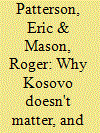

|
|
|
|
|
| Publication |
2010.
|
| Summary/Abstract |
Although observers from around the world have suggested that the 'Kosovo problem', particularly if it resulted in independence, had the potential to unsettle world politics, this is simply not likely. We argue that the Kosovo case is so unique that it is not an exemplar for international affairs. In other words, due to factors such as the scale of international investment, security commitments, and great power tutelage and recognition, Kosovo just 'doesn't matter' as a model for other separatist movements. That being said, we conclude with at least one feature of the long-running Kosovo intervention that has become an important pattern in US diplomacy - the liberation of average Muslim citizens from tyranny.
|
|
|
|
|
|
|
|
|
|
|
|
|
|
|
|
|
|
|
|
|